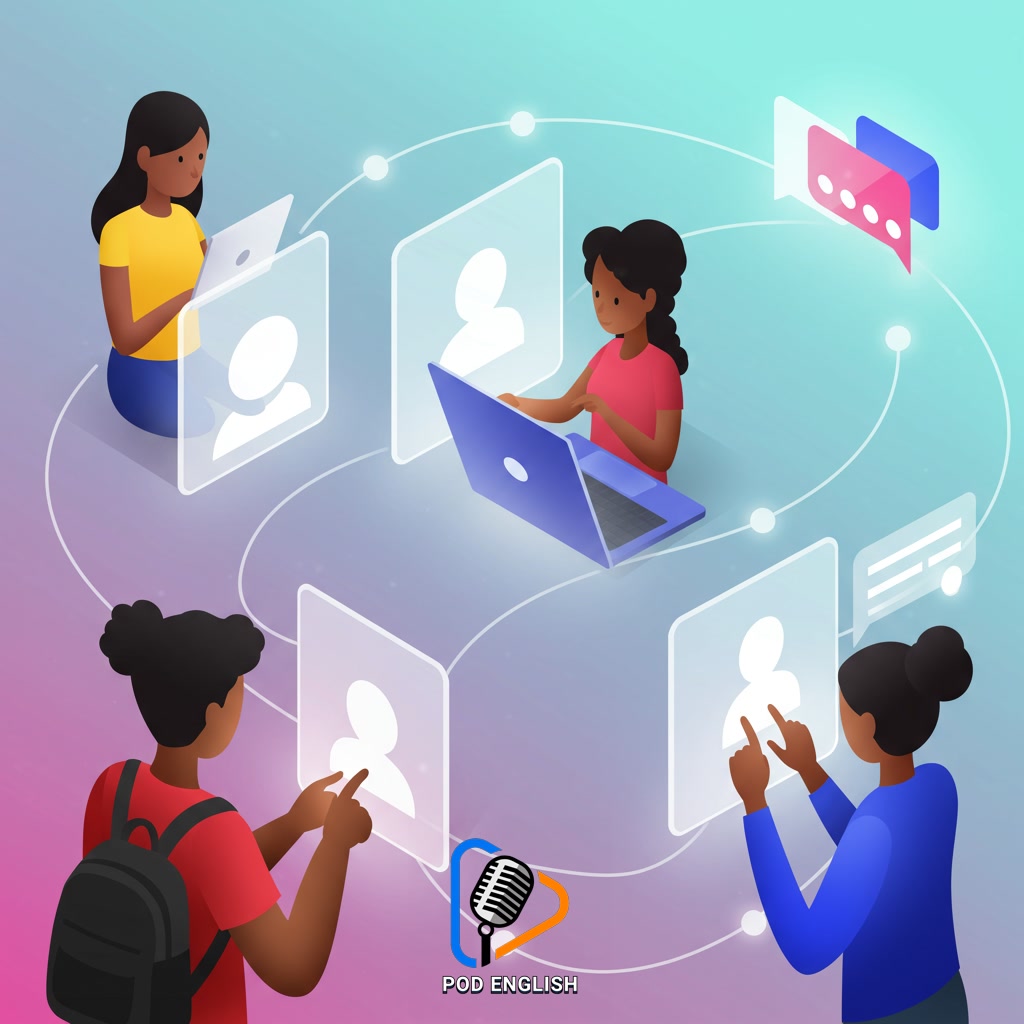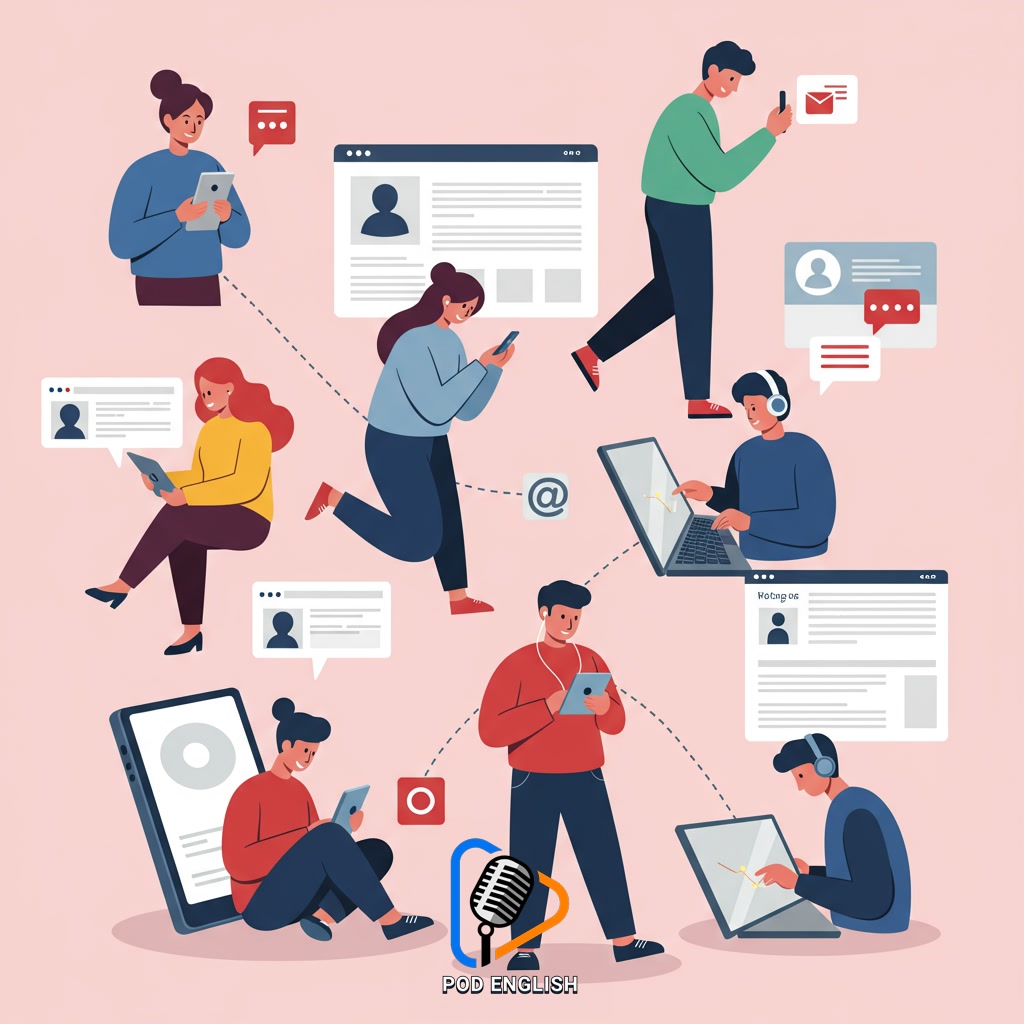Learn English
Learn English Faster Using Social Media Today
Social media platforms offer numerous opportunities for enhancing English skills. Engaging with native speakers, consuming authentic content, and practicing writing and listening can accelerate the learning process. This approach provides immersive and interactive ways to improve fluency and comprehension effectively and quickly.
Table of Contents
- Section 1: Introduction: Why Social Media for Faster English Learning?
- Section 2: How Social Media Enhances Different English Skills
- Section 3: Top Social Media Platforms and How to Use Them for Learning
- Section 4: Effective Strategies for Learning English on Social Media
- Section 5: Potential Challenges and How to Overcome Them
- Section 6: Conclusion: Making Social Media Your English Learning Ally
Section 1: Introduction: Why Social Media for Faster English Learning?
In today’s interconnected world, traditional methods of learning English are increasingly complemented by innovative digital tools. While textbooks and classrooms remain valuable, the sheer volume and accessibility of authentic English content online, particularly on social media platforms, present an unprecedented opportunity for accelerated learning. This introduction explores the fundamental reasons why integrating social media into your English study routine can significantly speed up progress. Unlike passive learning, social media encourages active engagement, providing real-time exposure to native language use, diverse accents, and colloquialisms. It creates a dynamic environment where practice feels less like a chore and more like natural interaction. By leveraging these platforms, learners can immerse themselves in English outside formal settings, making the journey towards fluency faster and more enjoyable.

Section 2: How Social Media Enhances Different English Skills
Social media platforms offer distinct advantages for honing various English skills. For reading, learners can engage with authentic content like news articles, blog posts, and user comments, encountering diverse vocabulary and grammar in context. Writing skills improve through composing posts, messages, and comments, receiving immediate feedback or observing native speaker interactions. Listening comprehension is boosted by watching videos, live streams, podcasts, and audio messages from native speakers, exposing learners to natural pronunciation and intonation. While direct speaking practice might be less frequent, voice messages and video calls with language exchange partners found via social media can provide valuable opportunities. This constant exposure and interaction across different formats make social media a powerful tool for integrated skill development.

Section 3: Top Social Media Platforms and How to Use Them for Learning
Numerous social media platforms offer unique avenues for English learning. Instagram and TikTok, for instance, excel for vocabulary and listening practice through short videos and visual content. Following English-speaking creators or educational accounts exposes learners to authentic language use and pronunciation. YouTube is invaluable for longer-form lessons, vlogs, and cultural insights, allowing for focused listening and comprehension development. Platforms like Facebook and X (formerly Twitter) are useful for reading diverse perspectives, practicing writing short posts or comments, and joining groups focused on English learning where interaction with peers and native speakers is possible. Engaging consistently with content and communities on these platforms transforms passive consumption into active language practice, making the learning process more dynamic and relevant.

Section 4: Effective Strategies for Learning English on Social Media
Building upon the platform awareness, effective strategies involve actively engaging with content and communities. Start by following native English speakers or educational accounts that post relevant material like short videos, infographics, or conversational snippets. Utilize features such as Instagram Stories or TikTok reels for listening comprehension practice and mimicking pronunciation. Participate in comment sections to practice writing, asking questions, or sharing thoughts. Joining Facebook groups centered around English learning or specific interests can provide opportunities for interactive practice and peer support. Consuming diverse content, from news clips on Twitter to educational videos on YouTube (often shared on social media), broadens vocabulary and understanding of different accents and contexts. Consistency in these daily interactions is key to accelerating progress.

Section 5: Potential Challenges and How to Overcome Them
Despite the many advantages of using social media for English learning, potential challenges exist that learners should be aware of. Distractions are perhaps the most common hurdle; constant notifications, irrelevant content, and the sheer volume of information can easily pull focus away from language practice. Furthermore, finding reliable and high-quality educational content amidst casual posts requires careful curation and critical thinking. Learners might also encounter negativity or unhelpful interactions. To overcome these issues, it’s essential to set clear learning goals and time limits for social media use. Actively curate your feed by unfollowing distracting accounts and seeking out verified educational profiles or hashtags. Remember that social media is a supplementary tool; integrate it with more structured learning methods and prioritize quality engagement over passive scrolling to maximize its effectiveness in accelerating your English skills.

Section 6: Conclusion: Making Social Media Your English Learning Ally
In conclusion, while potential distractions and negative influences exist, social media platforms truly offer a powerful and accessible pathway to accelerate English learning. By adopting a mindful and strategic approach, you can transform these platforms into invaluable allies. Focus on engaging with authentic content, interacting respectfully with native speakers, and leveraging features for practice. Instead of passively scrolling, actively seek out learning opportunities within your feed. Embrace social media not just for connection, but as a dynamic, immersive environment where consistent exposure and interaction can significantly boost your fluency, vocabulary, and overall confidence in using English effectively in the modern world.














